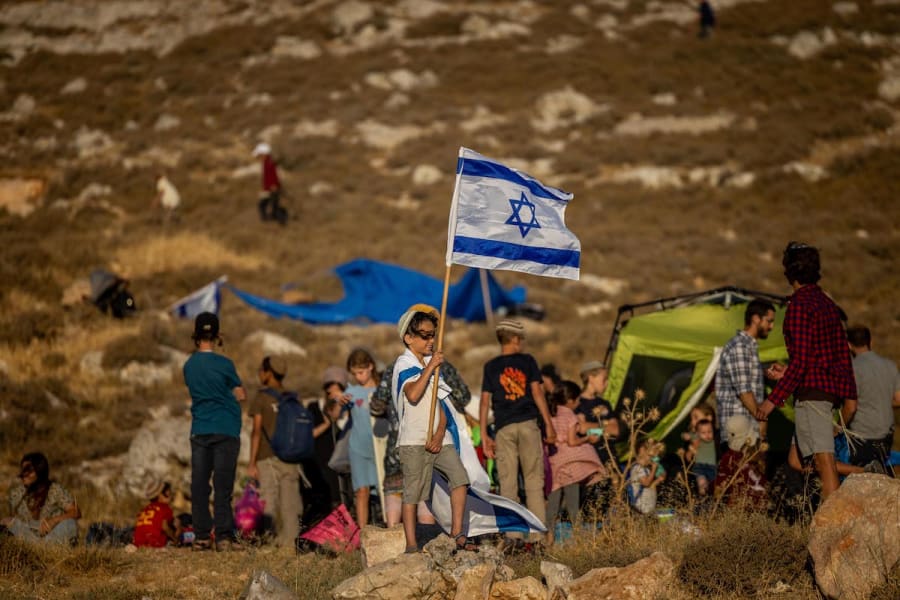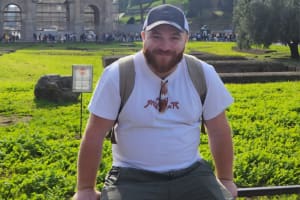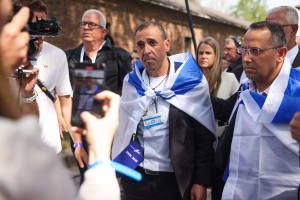Politics or despair: Behind this week’s biblical heartland settlement effort

Photographs of thousands of settlers storming six new illegal outposts in the West Bank filled social media networks this week, sparking outrage from the Left and resulting in at least five arrests.
But the move, according to at least some settler leaders, was meant to be nothing more than a PR stunt to send a message to politicians a week after U.S. President Joe Biden visited the region and spoke about a two-state solution as if it was 2008.
“Enough is enough,” said settler leader Josh Hasten, the international spokesperson for Gush Etzion, but spoke to ALL ISRAEL NEWS as a private citizen.
Hasten said it was no coincidence that the effort in Israel’s biblical heartland took place when Israel was in the middle of an election campaign – its fifth election in three years.
“There is no doubt that the people of Judea and Samaria are already wanting to see change on Nov. 1 ,” he said. “No one wants to go back to Oslo, concessions, promises of peace. We tried that before, and we got suicide bombings, an immediate 500% increase in rocket fire and a handful of deadly military operations.”
“We do not want to take these risks that have proven to be false messiahs,” Hasten added.
Wednesday’s operation brought out around 10,000 volunteers, according to the settler organization that spearheaded it, Nachala. The settlers picked out six sites and pitched tents in the areas. They made no effort to build permanent structures.
The settlers were joined, however, by at least three Knesset members: Orit Struck, Michal Waldinger and Itamar Ben Gvir, all members of the Religious Zionist Party.
Struck released a video message from an outpost near Kiryat Arba (the Jewish city connected to ancient Hebron) in support of the effort: “There are hundreds of families here, hundreds of people, with children, with babies, youth who have come from all over the country and have established a settlement here that should have always been part of Kiryat Arba,” she said in the film.
Interior Minister Ayelet Shaked tweeted in support of the activists, calling on police to “save their energy for eradicating real crime in the country,” rather than dismantling tents on hilltops. She called the youth who mobilized “wonderful” and a “true inspiration,” and said their dedication serves as “a guarantee that Zionism will succeed.”
CAN SETTLERS SWING THE ELECTION?
“Everything is connected to the election now and this is also part of it,” explained Prof. Moshe Hellinger of the Department of Political Studies at Bar-Ilan University. “The Religious Zionist Party wants to strengthen the force behind them, and this kind of move can help them.”
Settlers tend to have a high voting rate (close to 80%) compared to the rest of the population (around 70%), but their votes can be diverse. Data culled from the Israeli election committee by The Jerusalem Post after the 2019 election showed that the majority of settlers voted for Likud, followed by United Torah Judaism and third, what was then known as the “Union of Right-Wing Parties” – an earlier iteration of today’s Religious Zionist Party and Yamina.
Hasten said that right now, before any party lists have been registered, it looks like residents of Judea and Samaria have two options: casting their ballots for former Prime Minister Benjamin Netanyahu and his Likud Party or voting for the Religious Zionist Party with Bezalel Smotrich at its head and Ben Gvir as No. 2.
He said the majority of settlers will no longer look toward New Hope led by Gideon Sa’ar after his recent decision to run on a joint ticket with Blue and White led by Benny Gantz. Sa’ar was endorsed ahead of the last election by key settler leaders, including the recently resigned head of the Yesha Council, Jordan Valley Regional Council head David Elhayani.
“Gantz is pretending he can represent the right-wing, but people here see right through it,” Hasten contended. “This won’t be a successful strategy for [Gantz and Sa’ar] in Judea and Samaria.”
NETANYAHU AS NEMESIS OF CONSTRUCTION?
The settlers have had to become accustomed to being played by politicians, who make grandiose promises ranging from housing starts to annexation, but until now have done little to make good on these dreams.
The settlements were set up after Israel took the territory in the 1967 Six-Day War, although Israel never expressed sovereignty over the region. According to the NGO B’Tselem, there are more than 200 Israeli settlements today – including in East Jerusalem – with a population totaling nearly 620,000. Around 450,000 Israelis live in Judea and Samaria.
Netanyahu regularly promised to increase housing in the West Bank, but in reality, his record was similar to less-conservative leaders. In 2010, a year after resuming the premiership, he agreed to a 10-month de facto settlement freeze to placate his then-American counterpart, President Barak Obama, which did not include Jerusalem.
Later former U.S. President Donald Trump’s administration declared the settlements legal, which should have paved the way for a building spike. However, according to a 2020 report by the left-wing, anti-settlement watchdog group Peace Now, Israel’s average annual construction rate in the Jewish settlements increased only by around 25% between 2017 and 2020. In 2019, there were fewer construction starts than in 2018.
At the same time, the government continues to ignore illegal Palestinian construction in Area C, according to Naomi Kahn, director of the international division of the NGO Regavim.
She said there were more than 72,000 illegal Palestinian structures in Area C in 2021, compared to less than 30,000 in 2008 – an increase of nearly 45,000 structures. This number does not include agricultural takeovers, which can be more complicated to track.
“The footprint of the settlements in Judea and Samaria have not changed in a very long time or only negligibly, but the footprint of the Palestinians over the territories has expanded vastly,” Kahn contended. “Just like illegal construction of Jewish outposts is illegal, so too actions against illegal Arab construction should be enforced equally, aggressively and universally. Otherwise, we have chaos.”
Moreover, a series of goodwill gestures by Israel ahead of Biden’s visit helped fan feelings of frustration among the settler community.
The Coordinator of Government Activities in the Territories (COGAT) announced shortly before Biden’s visit a series of measures intended to ease Palestinians’ daily lives. These included legalizing the status of 5,500 undocumented Palestinians and foreigners living in the West Bank and Gaza, as well as approving six Palestinian housing projects in Area C.
Israel also agreed to delay a meeting to advance Jewish housing projects in eastern Jerusalem until after Biden’s trip, pushing off any decision until at least September.
Kahn said that the settler activists who turned out on Wednesday were acting in “desperation.”
“Elections come and elections go, but the changes on the ground have not come about as the right-wing parties promised or expected,” Kahn said.
Bar-Ilan’s Hellinger said that the settlers are starting to understand that no matter who gets in office, there will be no major change. Any coalition, he said, whether led by Netanyahu and with or without Sa’ar and Gantz, will likely not annex the West Bank nor move toward a two-state solution.
Kahn said that nonetheless, she hoped Israeli politicians would use this election period to redefine the issues, set agendas, and clarify their vision for the biblical heartland.
“Elected officials and those who want to be elected should express themselves in terms of a vision moving forward rather than pulling on the same end of a fraying rope,” Kahn said.
.jpg)
Maayan Hoffman is a veteran American-Israeli journalist and strategic communications consultant. She is Deputy CEO - Strategy & Innovation for the Jerusalem Post, where she also served as news editor, head of strategy and senior health analyst.














